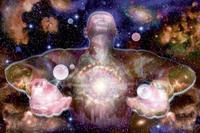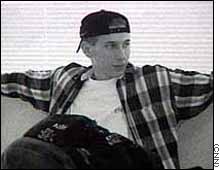| Tuesday, April 20, 2004 |
| Super Free Will |
 Paul Hughes makes a compelling case for free will as an unavoidable constant, tying into and going beyond neuroscience, quantum mechanics, and many other subjects. Article "Super Free Will: Metaprogramming & Quantum Uncertainty" at FutureHi. Paul Hughes makes a compelling case for free will as an unavoidable constant, tying into and going beyond neuroscience, quantum mechanics, and many other subjects. Article "Super Free Will: Metaprogramming & Quantum Uncertainty" at FutureHi.
Neuroscientists and behavioral scientists and cognitive researchers can show how most of our behaviors and thoughts can be shaped or controlled by chemistry and by the inputs we are provided. By finding the right place to put electrodes on someone's brain, or by setting up an environment that influences them in a particular way, one can shape people's reality, and the throughts and feelings they have, to a remarkable extent. The funny thing is that eastern mystics and yogis and meditators might say similar things, from another angle. Most of what you do is just robotic, arbitrary behavior patterns that you do completely automatically, based on what has been imprinted and conditioned into you. You walk around, half-asleep, in an arbitrary world that is projected for you, having thoughts and feelings that mostly aren't your own. Ok, so where does free-will come in? So far it seems like I’ve decimated every last shred of free-will and human dignity. Yes, and for good reason! Unless we understand the full extent of just how brainwashed and programmed we are, we will never have anything close to a free-will. To be free it first helps to intimately understand just how imprisoned we are by our own nervous system. Freedom comes from knowledge, not ignorance. To know thyself is the pathway to liberation and freedom, as I will now explain.No matter what we do, we're mostly dealing with a world that comes in through our perceptions and our nervous systems, and before we even get around to having a thought about something, we're already many levels of abstraction removed from the real event. And when we form ideas and concepts and try to share them with each other, they're all subject to the same limitations. Even scientists are thoroughly conditioned into logical fallacies developing from layers upon layers of fuzzy abstractions and semantic and neurological limitations. The answer is that the only thing that leads out of the trap is consciousness that includes knowledge of all these limitations and that strives to transcend them. Quantum mechanics entails that any measurement includes uncertainty. Even if you check it with another measurement, it just involves more uncertainty. Ad infinitum. The only thing that breaks the chain is when a conscious observer decides what it means. Likewise, no matter how mired we are in uncertainty and subsconscious conditioning from our environment, we can always move a step up. We can encompass all the uncertainty, including our own imperfect perceptions and memories, and aim at getting what the meta-program is. We can increase our freedom and free will and awareness by understanding better how things work, and by transcending the previous limits we experienced. If we don't add in our own consciousness, we'd keep going in circles. But by becoming conscious of a new understanding, which provides more choices and more freedom, we can actually move up in the spiral. And we can repeat that any number of times. Finding how our previous beliefs and behavior patterns limited us, and moving on to a meta-understanding of them, which gives us more flexibility. But which, of course, again becomes a limitation sooner or later, which we need to transcend. All of this includes, of course, not just how we think, but how capable we are at working with our environment. So here we are altering our own molecular DNA, and soon the entire physical world down to the atomic level. Another way of looking at this, is DNA having evolved out of the slime, is now becoming recursive enough to begin altering itself with internationality and purpose towards something stronger, smarter and more versatile. Going further, the atomic world is now becoming aware of itself, and as it becomes aware of these limits, just like we becoming aware of our own programming, will begin to re-program this matter to become more expressive to this internationality, to the logos, the memeplex that is our noosphere. Will this self-recursion ever end? Probably not. Do we have free will? As I have shown, free-will is a matter of degree. It is easily demonstrated that we can increase the levels and degrees of freedom as we become aware of our own limits. I would say, not only is there free-will, but eventually everything in the universe, including the very essence of ourselves will become re-defined by it. In the end, everything will change, but one thing will remain and increase, the level of our free will, our consciousness, the fundamental that is and comprises everything.As Paul says, free will not only exists, but ultimately it is all that remains in an ever changing uncertain universe. And I agree. For that matter, it seems abundantly logical to me that the universe and our existence in it makes no sense without the perpetual existence of consciousness. I.e. being aware of something and being able to make a choice about it. That can happen at very low levels, automatically and imperfectly, or it we can strive towards doing it better, gaining more all-encompassing wholistic knowledge, understanding ourselves and the universe better, and doing more interesting things with that new awareness. [ Knowledge | 2004-04-20 05:49 | 7 comments | PermaLink ] More > |
| In the mind of a psychopath |
 Very interesting article by Dave Cullen: "The Depressive and the Psychopath" about the conclusions made about what really went on in the minds of the Columbine killers. The mostly publicized story is that they were outcasts who had been picked on, and who were taking revenge against those who bullied them. And that their motivations otherwise are inexplicable. The conclusions reached by a group of FBI psychologists are both more horrifying and more enlightening and useful. Very interesting article by Dave Cullen: "The Depressive and the Psychopath" about the conclusions made about what really went on in the minds of the Columbine killers. The mostly publicized story is that they were outcasts who had been picked on, and who were taking revenge against those who bullied them. And that their motivations otherwise are inexplicable. The conclusions reached by a group of FBI psychologists are both more horrifying and more enlightening and useful.Fuselier and Ochberg say that if you want to understand "the killers," quit asking what drove them. Eric Harris and Dylan Klebold were radically different individuals, with vastly different motives and opposite mental conditions. Klebold is easier to comprehend, a more familiar type. He was hotheaded, but depressive and suicidal. He blamed himself for his problems.The distinctions are very well worth understanding in detail. "Psychopath" isn't just a good thing to call people one doesn't like or who do something bad. There is something very specific that makes such a person different. In this case Eric Harris was the psychopath. It was not at all about simple revenge, and his aim was for something much grander than merely the most deadly school shooting in U.S. history. Because he was a person thinking differently from you and I. It begins to explain Harris' unbelievably callous behavior: his ability to shoot his classmates, then stop to taunt them while they writhed in pain, then finish them off. Because psychopaths are guided by such a different thought process than non-psychopathic humans, we tend to find their behavior inexplicable. But they're actually much easier to predict than the rest of us once you understand them. Psychopaths follow much stricter behavior patterns than the rest of us because they are unfettered by conscience, living solely for their own aggrandizement. (The difference is so striking that Fuselier trains hostage negotiators to identify psychopaths during a standoff, and immediately reverse tactics if they think they're facing one. It's like flipping a switch between two alternate brain-mechanisms.)Seems like it should be very important to find better ways of recognizing such people early. Shouldn't really be all that hard if it can be based on such rather clear criteria. [ Information | 2004-04-20 18:46 | 19 comments | PermaLink ] More > |